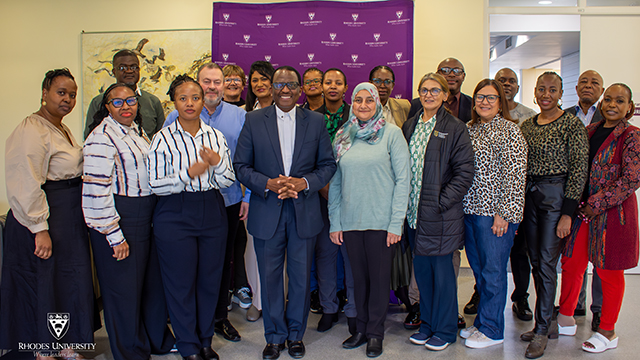
By Siqhamo Jama
Rhodes University recently hosted the Human Resource Directors’ Forum, which brought together senior HR leaders from South Africa’s public universities for two days of strategic discourse and reflection.
The forum drew participation from institutions including the Universities of Cape Town, Johannesburg, KwaZulu-Natal, North-West, Pretoria, Sol Plaatje, Stellenbosch, Tshwane, Western Cape and Zululand. Rhodes University’s Director of People and Culture, Mrs Susan Robertson, chaired the event, with secretariat support provided by Ms Felicity Kokose, sector support manager from Universities South Africa (USAf).
The agenda included widespread topics, from integrated talent management, AI, and the future of work, to transformation, wellness, and employment equity. A keynote address by Rhodes University Vice-Chancellor, Professor Sizwe Mabizela, delivered on the morning of 8 May, formed a significant highlight of the event.
In welcoming delegates, Professor Mabizela recognised the critical role of HR professionals in the higher education sector. “Your dedication and expertise play a vital role in supporting and advancing the academic mission of our universities,” he said. “You ensure the attraction, development, and retention of high-quality academic, support, and administrative staff.”
His address directly confronted national debates around the employment of international staff at South African universities, particularly the perception that internationals are employed at the expense of South Africans. Professor Mabizela called these views “specious” and “largely driven by a lack of comprehension of the recruitment and selection processes, and to a greater extent, by Afrophobia.”
“Meeting the minimum requirements for a position does not automatically render a candidate appointable,” he asserted. “There is a huge distinction.”
He defended the presence of international professionals in academia, particularly in scarce-skills areas like science and technology, but urged HR leaders to strengthen mechanisms for significant skills transfer.
“It must be deliberate. It must be intentional. It must be purposeful,” he said. “We must ensure that when an international expert leaves, they don’t take the skills.”
Responding to questions from forum attendees, Professor Mabizela acknowledged that while Rhodes University has made significant strides in transformation, particularly at the Council level, progress remains uneven across the sector, particularly at senior academic levels. “However, we are making progress,” he said.
He further urged delegates not to dismiss public concerns, even when rooted in misinformation. “Someone’s perception is their reality,” he said. “We must engage constructively and ensure accurate information is communicated within our institutions and the broader public. We must lead with facts, transparency, and humility.”
Beyond transformation, Professor Mabizela addressed wider sector concerns, including public universities' financial strain, the unbundling of traditional degrees, and competition from private institutions. “University education is more than just a qualification,” he remarked. “It is about the formation of young people intellectually, ethically, and socially. That must remain central to what we do.”
He closed with a call for cooperation across institutions. “We are too small a system to engage in destructive competition,” he said. “We must lift each other, share expertise, and rise together, because a rising tide lifts all ships.”
The conference concluded with feedback from USAf’s strategic working groups, including updates from the Employment Equity Managers’ Forum, the Employee Health and Wellness Forum, and the Employee Relations Forum. Delegates reflected on the value of sectoral coordination and shared knowledge.
Mrs Robertson, in her closing remarks, noted: “What gives this forum its value is the collective wisdom in the room, and our shared responsibility to lead change across our universities.”
As delegates prepared to depart, the outlook was clear: the future of higher education would be shaped not in isolation but through meaningful discourse, ethical leadership, and enduring collaboration.
